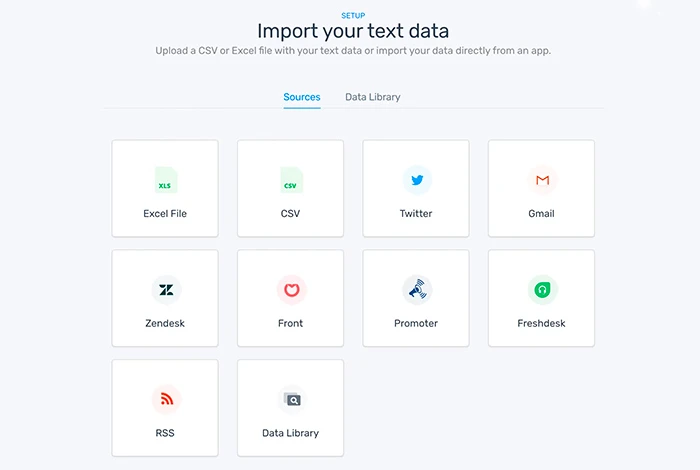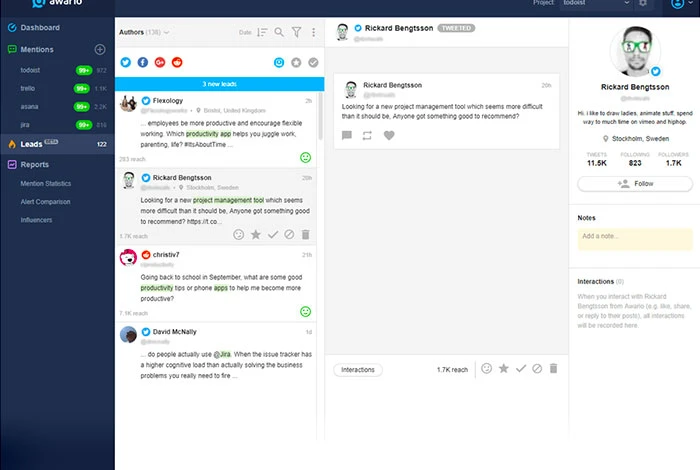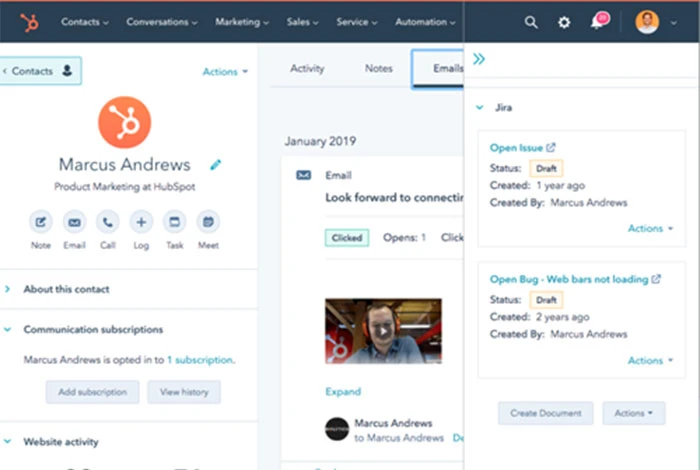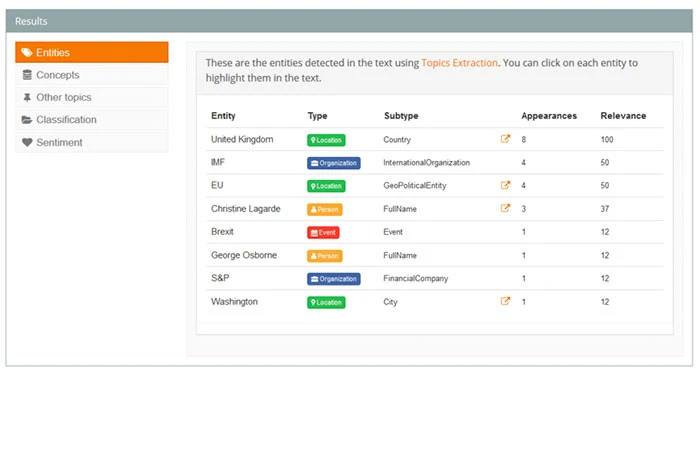11 Best Sentiment Analysis Tool Online for Free in 2026

Summary: Using a text sentiment analysis tool, you can find out which competitor is receiving positive mentions and also learn about your audience through social mentions. Thus, by analyzing their tone or language, you can also incorporate the same in your marketing strategy to improve your brand image.
Maintaining a good brand reputation is important for the success of your organization. A positive brand reputation can help you close more sales, build customer loyalty, and improve customer experience. Therefore, to maintain your brand image, it is essential you closely monitor your brand image on different social media platforms, review websites, etc.
For that purpose, you can use a sentiment analysis tool. This tool can help you understand what your customers are saying about your brand, competitors, and industry.
Sentiment analysis tools analyze emails, reviews, chat transcripts, mentions, and comments to identify the sentiments expressed by your customers about your product, service, and brand. Once analyzed, it will determine whether the tone or sentiment is positive, negative, or neutral.
This information can be used to improve your marketing campaigns and boost sales. Let’s learn more about sentiment analysis tools in detail below.
Why Use Sentiment Analysis Tool for Organization?
Using sentiment analysis software can help your organizations in multiple ways, such as:
- Measuring the effectiveness of your marketing and PR campaigns
- Generating customer feedback about your products and services
- Generating content that addresses the needs of your target audience
- Monitoring social media to identify any negative comments impacting the brand reputation
11 Best Sentiment Analysis Tool Online for Free in 2026
- Social Searcher
- Brandwatch
- Rosette
- TalkWalker
- MonkeyLearn
- Idiomatic
- Awario
- Hootsuite Insights
- HubSpot’s Service Hub
- MeaningCloud
- SentiSum
With the free sentiment analysis tools, it has become much easier for organizations to detect the negative, positive, and neutral sentiments in customer reviews, comments, public mentions, etc. Here are some of the best sentiment analysis tools you can use for this purpose:
1. Social Searcher

Social Searcher is a free social media search engine that helps identify and monitor public mentions across the web and social media platforms like Instagram and Twitter.
With features like sentiment analysis and social analysis, you can easily track what your audience is saying about your brand, product, and service across various platforms.
Features of Social Searcher
- Analyzes content across various platforms
- Provides insights on your target audience behavior triggers like preferred post types, most active time, liked pages, etc.
- Gives your top hashtags performing on various social media platforms
- Stores the history about all mentions from web and social media
Pros and Cons of Social Searcher
- It automatically sends alerts via email when your brand is mentioned on any platform.
- With it, you can export data into several file formats.
- It sends only 10 email alerts even in its premium plan.
Free Trial: 14 days
Social Searcher Pricing: Free plan available | Paid plan starts from INR 316.67/month
2. Brandwatch

Brandwatch enables you to monitor online mentions about your brand and understand your customer voice. With this sentiment analyzer, you can anticipate the consumer demand, monitor your brand, generate engaging content, and improve customer engagement.
This sentiment analysis tool can also help you in identifying social media trends, collaborating in real-time to create content, monitoring threats across platforms, etc. Further, you can also manage all social media platforms with its social media management functionality.
Features of Brandwatch
- Monitors different social media channels to identify brand mentions
- Performs sentiment analyses of audience engagement data in 44 languages
- Provides an API to upload text-based data for analysis
- Categorizes data to analyse different data sets
- Provides components to visualise data graphs and charts
- Automatically detects gender, location, and interests of your audience
Pros and Cons of Brandwatch
- You can store all your content in a digital asset library.
- Through NPL(Natural Language Processing), it automatically identifies brands, people, locations, hashtags, etc., in your data.
- It offers limited options to categorise customer conversations.
Free Trial: Not available
Pricing of Brandwatch: Price is available on request on its official website
3. Rosette
Rosette AI driven sentiment analyzer can help in identifying and analysing sentiments in different text types related to companies, customers, and products. It uses machine learning models to identify positive, negative, and neutral sentiments in any document types.
With Rosette, you can categorise your content, identify the topic of customer service queries, define the relationship between two data entities, filter out spam emails, etc.
Features of Rosette
- Analyzes text documents in 30+ languages
- Performs sentiment analysis to identify sentiments in different texts
- Automatically identifies people, organizations, places, and products in text
- Categorizes social media posts via topic to identify trends and segment the audience
- Combines multiple mentions of a specific entity like a product in a single document
Pros and Cons of Rosette
- It can identify text similarity and relevant keywords in multilingual documents.
- Offers a topic extractor to extract relevant keywords and phrases from any text.
- It can detect only 18 types of entities in text documents.
Free Trial: 30 days
Rosette Pricing: No free plan available | Paid plan starts from INR 8,186.25/month
4. TalkWalker

Talkwalker is a consumer intelligence acceleration platform that lets you gain actionable insights through real-time customer data analysis.
This sentiment analysis tool looks at all mentions and comments about your brand on different social media platforms to understand how your audience perceives your brand. It can also be used for social listening, social media monitoring, customer feedback analysis, and report generation.
Talkwalker Features
- Provides insights by evaluating data from social media, websites, and customer feedback sources
- Supports real-time collaboration on different datasets
- Performs social benchmarking to identify improvements areas
- Performs sentiment analysis to understand the audience behavior towards your brand
- Identifies trending topics to create PR campaigns
- Segments audiences based on behavior and engagement
Pros and Cons of Talkwalker
- It also sends alerts for the media coverage about your brand.
- Offers Silk GPT to analyze millions of customer’s conversations and learn about what your customers are thinking about your brand.
- You can collect feedback from 100 sources only.
Free Trial: Available
Pricing of Talkwalker: Free plan available | Paid plan details are available on request
5. MonkeyLearn

MonkeyLearn machine learning platform helps users with text analysis. With this software, you can detect the sentiments expressed in different text types like tweets, chats, articles, reviews, and so on.
MonkeyLearn creates automated Classifiers to classify and categorise your text for different data types. Further, you can create Extractors to identify different data like keywords, company names, emails, etc., in your text.
MonkeyLearn Features
- Generates and visualizes data via graphs and charts
- Filters data via several data inputs and custom fields
- Provides pre-built and custom machine learning models to analyse data
- Offers multiple templates for different data types for analysis
Pros and Cons of MonkeyLearn
- Provides integration with multiple apps like Zapier, Zendesk, SurveyMonkey, Gmail, and so on.
- It can be used to customize workflows related to data analysis
- Its real-time review analyzer does not function properly.
Free Trial: 14 days
MonkeyLearn Pricing: Free plan available | Paid plan starts from INR 24,433.53/month
6. Idiomatic
Idiomatic’s AI-driven sentiment analysis software is used to analyse and identify customers’ sentiments towards your brand in millions of reviews quickly.
With it, you can track customer sentiment through a specific channel and customer segment over time. Therefore, providing you with insights to turn customers’ negative sentiments into positive ones.
Further, this text sentiment analysis can also help you in visualizing sentiments trends, viewing sentiments based on keywords, and building customized reports.
Features of Idiomatic
- Identifies customers pain points in their reviews and feedback through AI-based analysis
- Categorizes and quantifies customer feedback from different sources
- Generates custom labels for different types of data sets
- Identifies customer trends across various social media platforms
- Uses machine learning models for feedback categorization
Pros and Cons of Idiomatic
- This software offers different sentiment analysis tools to analyze different data like app reviews and support tickets.
- With it, you can generate and track various user segments.
- It offers limited integration options.
Free Trial: Available
Idiomatic Pricing: Free plan available | Paid plan starts from INR 81,749.00/month
7. Awario

Awario is a brand monitoring tool that helps you in analyzing all your brand mentions across different social media, review sites, forums, blogs sites, etc. It tracks the most relevant mentions to understand the audience and improve the marketing strategy.
Some common features of this sentiment analyzer include location-based monitoring, social listening reports, marketing campaigns tracking, real-time sentiments changes tracking, etc.
Awario Features
- Monitors different web channels in real-time for brand mentions
- Sorts brand mentions into positive and negative categories
- Analyzes the competitor’s strengths and weaknesses to improve your marketing strategy
- Provides opportunities for social selling and lead generation
- Organizes different mentions about your brand into folders
Pros and Cons of Awario
- With it, you can also identify the geolocation of your mentions.
- Helps identify top influencers from different social media channels to promote your brand.
- It has a steep learning curve
Free Trial: Available
Pricing of Awario: No free plan available | Paid plan starts from INR 4,006.26/month
8. Hoostsuite Insights
Hootsuite Insights is a social listening tool that helps you gain insights into what people are saying about the brand, competitors, and industry.
Hootsuite Insights can be used for managing social media, publishing content online, managing campaigns, identifying social trends, analyzing brand sentiments against competitors, etc. Hootsuite Insights can also help you with competitive and industry benchmarking.
Features of Hootsuite Insights
- Tracks the brands mentions across the social media in real-time
- Identifies ongoing trends in your industry
- Studies the market data to identify the best time to launch products
- Sends alerts when there is change in customer sentiments
- Offers the AI data analyst to analyze data and gain valuable insights
Pros and Cons of Hootsuite
- You can also see where your target audience spends the most time on social media with the social mention monitoring feature.
- It also lets you track all the ads you run on your social media channels.
- Limited reporting capabilities in the free plan.
Free Trial: 30 days
Pricing of Hootsuite Insights: No free plan available | Paid plan starts from INR 1,915/month
9. Hubspot’s Service Hub

Hubspot’s Service Hub provides a customer feedback tool that helps you in breaking down survey responses and analyzing them for positive and negative sentiments.
The software uses Net Promoter Score (NPS) to understand whether the customer review is in good or bad sentiments. With it, you can visualize customer data, review surveys of specific customers, analyze social media performance, manage ads campaigns, etc.
Features of Hubspot’s Service Hub
- Creates and shares surveys with customers
- Sends notifications when a visitor log in your website
- Creates marketing campaigns via automated bots
- Creates and optimizes blogs and landing pages content
- Enables you to collect feedback for chatbot conversations
Pros and Cons of Hubspot
- Offers a built-in live chat feature to connect with your customers.
- With it, you can also customize workflow automation rules.
- Users find it difficult to customize email templates.
Free Trial: Available
Hubspot’s Service Hub Pricing: Free plan available | Paid plan starts from INR 36,809.78/month
10. MeaningCloud

MeaningCloud is a textual analysis tool that can be used for generating meaningful insights from large textual data sets. With its sentiment analysis API, you can easily perform sentiment analysis of texts from various sources like social media, reviews sites, etc.
You can use this software for creating your own data classification models, customizing sentiment analysis APIs, monitoring social media engagement, analyze press clippings, etc.
Features of MeaningCloud
- Extracts concepts and their relations in documents via documents analytics
- Analyzes your customers’ data to identify bottlenecks in your organization
- Creates and monetizes content for different platforms
- Performs social media analysis to identify trends and customer sentiments
- Manages customers feedback from different channels to improve their experience
- Monitors social media channels to identify any threats to your brand reputation
Pros and Cons of MeaningCloud
- You can analyse the customer feedback in 44+ languages.
- It provides public APIs for topic extraction, sentiment analysis, text clustering, etc.
- It takes a lot of time to publish content on social media.
Free Trial: Available
Pricing of MeaningCloud: Free plan available | Paid plan starts from INR 8,101.71/month
11. SentiSum
SentiSum analyzes customer conversations across multiple channels to gain actionable insights and improve customer experience. Some tasks that you can perform with this sentiment analysis software include automated ticket escalation, customer feedback collection, CSAT surveys analysis, customer data integration, etc.
Features of SentiSum
- Offers AI-based analyzer to analyze customer conversation for emails, chats, surveys, reviews, etc.
- Performs real-time analysis to prioritize and escalate customer queries
- Categorizes conversations based on topic, intent, and customer sentiment
- Provides granular reports with the root cause analysis of negative customer sentiments
- Identifies topics and sentiments from surveys via machine learning analysis
- Automatically prioritizes customer tickets based on risk and intent
Pros and Cons of SentiSum
- You can access this software in 100+ languages.
- With the power of AI, it automatically extracts relevant data from conversation threads.
- This text sentiment analysis tool is quite expensive as compared to its competitors.
Free Trial: Available
Pricing of SentiSum: No free plan available | Paid plan starts from INR 1,63,723.00/month
How Sentiment Analysis Works?
Sentiment analysis utilizes ML models for performing text analysis. The metrics used in the analysis help identify whether sentiments expressed in any text are positive, negative or neutral. This is how sentiment analysis work:
Step 1: The sentiment analyzer identifies specific keywords to highlight the main meaning behind the content.
Step 2: Next, it breaks down the content into multiple components or tokens
Step 3: In the next step, the tool removes words that do not add value to the required sentence.
Step 4: With natural language processing (NPL) and machine learning algorithms, the keywords are analyzed, and a sentiment score is provided.
Step 5: The score is used to get a relative perception of the sentiment expressed in the content for further analysis.
Conclusion
Sentiment analysis tool can be leveraged to perform multiple tasks. From monitoring social media, analyzing product reviews to performing competitor research, this tool can help you a lot in enhancing your brand image. Based on the detailed comparison of various tools, Social Searcher, Brandwatch, and MonkeyLearn are the best sentiment analysis tools that you can use for free.
FAQs Related to Sentiment Analysis Tools
What is a sentiment analysis tool?
A sentiment analysis tool is an AI software that analyzes the text data to identify positive, negative, and neutral sentiments in the content shared by your customers across different web channels.
What is NLP used for sentiment analysis?
Natural language processing is used in sentiment analysis to identify the tone or sentiments in any content related to a person, entity, product, etc.
Which method is best for sentiment analysis?
There are three main methods used for sentiment analysis including Lexicon Based Approach, Hybrid Approach, and Machine Learning Approach. The best method to consider is Hybrid method where you can leverage both other methods for text analysis.
What are the three main sentiment analysis methods?
The three main sentiment analysis methods are Lexicon Based Method, Machine Learning Method, and Hybrid Method.
What is the difference between NLP and sentiment analysis?
Sentiment analysis is a subset of Natural Language Processing (NLP). It is a kind of data mining technique that tries to understand and measures customers opinions and stances via NLP.
Which type of data is used for sentiment analysis?
Sentiment analysis is used to analyze different types of text data which might include public mentions, comments, reviews, press releases, and so on.
What is the simplest sentiment analysis?
The simplest sentiment analysis can be done using a scored word list. For example, you can create a list of words that are scored between +5 and –5. Next, you can split a given content into distinct words and compare them with the word list to get the final sentiment score.
What is the first step in sentiment analysis?
The first step in sentiment analysis is to choose the type of content for which you want to perform the analysis. For example, you can choose from analyzing conversation threads, comments, or mentions.
Varsha is an experienced content writer at Techjockey. She has been writing since 2021 and has covered several industries in her writing like fashion, technology, automobile, interior design, etc. Over the span of 1 year, she has written 100+ blogs focusing on security, finance, accounts, inventory, human resources,... Read more





























